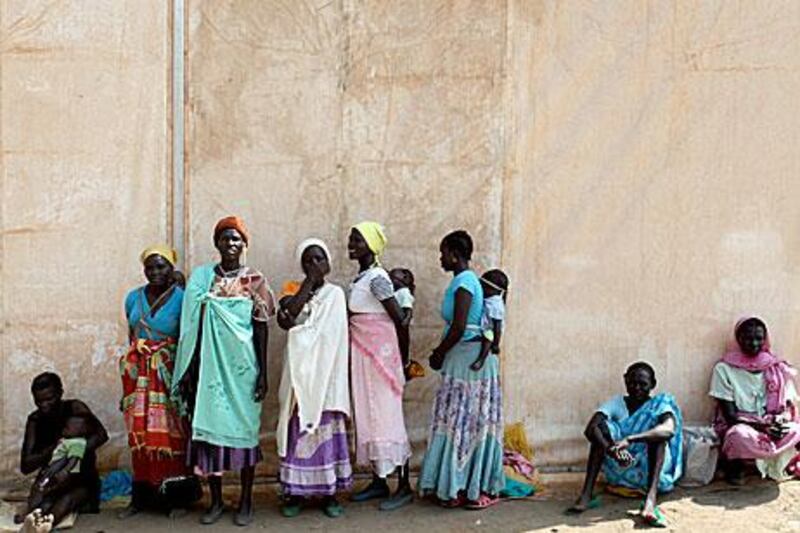JUBA, SOUTH SUDAN // The Obama administration is planning a possible humanitarian operation to prevent mass starvation in two Sudanese states in defiance of the Khartoum government, which has refused to allow aid groups access.
"We are simply not going to sit back and watch while 100,000 people starve to death," a state department official, speaking on condition of anonymity told The National.
"We are actively planning and Khartoum knows this."
Humanitarian agencies pulled out of the two states when fighting between Khartoum and insurgents erupted in June in Southern Kordofan and spread to neighbouring Blue Nile in September.
On Wednesday, the US' special envoy to Sudan, Princeton Lyman, told reporters in South Africa that about half a million people could face "emergency conditions bordering on famine".
"That's something that our government at the highest levels cannot let happen," said the state department official.
He refused to divulge details of how aid would be moved into Southern Kordofan and Blue Nile states, saying the plan is "obviously quite sensitive".
Mr Lyman told reporters that as Khartoum continues to block international and UN agencies access to the area, pressure is mounting to "provide assistance across the border against the wishes of the government of Sudan", but added, "We have made no decision to do that."
Zach Vertin, a Sudan analyst with the Brussels-based International Crisis Group, told Bloomberg News that the US faces a difficult decision.
"Washington has given this a great deal of thought, as it and others have made clear that it will be difficult to ignore further catastrophe in Southern Kordofan. The challenge will be to minimise any broader costs in doing so," he said.
Mr Vertin added that providing aid without Khartoum's consent could have negative consequences.
"It's a very tough call, but with Khartoum providing no avenues for cooperation and an even greater humanitarian crisis looming, Washington feels pressed to act," he said.
"Such a move could potentially prompt a negative response from Khartoum, cause further deterioration of US-Sudan relations, and generate consternation from those already made wary by international intervention in Libya."
John Ashworth, an expert on the region who has spent 28 years in Sudan and South Sudan, said a US push to move aid into Southern Kordofan and Blue Nile could worsen Khartoum's already troubled relations with the US as well as South Sudan.
"Khartoum will certainly try to portray it as South Sudanese assistance to a rebel group, rather than as a humanitarian response to Khartoum's own intransigence," said Mr Ashworth.
The insurgents are former armed divisions of the Sudan Peoples Liberation Movement, which is now the ruling party in South Sudan. The movement fought a two-decade civil war that led to South Sudan's secession. When the south declared independence on July 9, the Southern Kordofan and Blue Nile divisions declared themselves a separate political party and added "North" to their name.
Khartoum has accused Juba of backing the rebels - a charge South Sudanese officials including the president, Salva Kiir, have repeatedly denied.
But in a November 21 statement, the White House noted that Mr Lyman had discussed with South Sudan "the need to respect the sovereignty of Sudan, including by ending support for the Sudan People's Liberation Movement-North (SPLM-N) in Southern Kordofan and Blue Nile."
The nature of that support "is both material as well as command and control", said the state department official. He added that the UN Security Council "is basically paralysed" because it does not want to intervene in Sudan, even on humanitarian grounds, while South Sudan is backing the SPLM-N.
"I imagine that a number of council members will for now be reluctant to sanction any move that further infringes Sudan's sovereignty," said Aly Verjee, an analyst with the Rift Valley Institute. "The situation will probably have to deteriorate further before any real action is contemplated."
Meanwhile, Juba has accused Khartoum of arming militia groups in an attempt to destabilise South Sudan. Those allegations are backed up by organisations such as the Geneva-based Small Arms Survey. "We've gathered evidence that strongly links weapons used by southern militias to Khartoum," said Jonah Leff, a researcher with the group. "Weapons in rebel stocks seem to correlate closely with Sudan Armed Forces' small arms arsenal."
Mr Ashworth said a US-backed humanitarian aid operation into Southern Kordofan and Blue Nile could hurt relations between Khartoum and Juba, but it would be better than Juba providing support itself.
"If South Sudan were to unilaterally assist beleaguered civilians in Sudan, it would be easier for Khartoum to justify some form of retaliation," he said. "But if the USA is fronting an international humanitarian effort, that might prove more difficult."
foreign.desk@thenational.ae
US plans possible Sudan aid operation in defiance of Khartoum
The Obama administration is planning a possible humanitarian operation to prevent mass starvation in two Sudanese states in defiance of the Khartoum government

Editor's picks
More from the national




